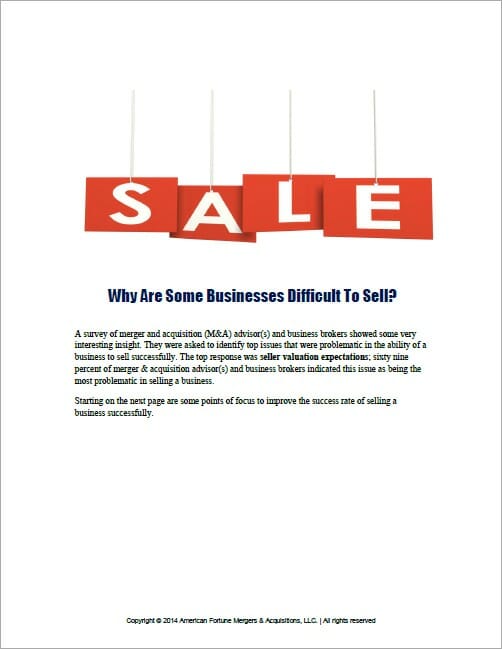
Proven Advice on How to Sell a Business Successfully
Many are shocked when their learning how to sell a business successfully that it can take years of planning. Business owners don’t typically invest that amount of time and usually have to sell under less-than-ideal conditions. They are so busy running the day-to-day operations that they don’t give due consideration to selling. Because of that, they lose sight of specific factors that lead to common missteps and lost opportunities when they are selling.
Business brokers frequently advise business owners to obtain a comprehensive valuation and to take steps to prime the company for its best value. What exactly does that mean for owners who want to know more about the selling process? It all starts with understanding the terms that produce desirable results and how to make their business as attractive as possible to potential purchasers.
Learning how to sell a business successfully demands that the owners and brokers address and manage many factors to properly prepare for a maximum return.
Address These Items to Build Market Value and Successfully Sell a Business Faster
These steps can directly impact market value and how quickly you can sell your business. As you learn how to sell your business, it’s easy to understand that you need to do these things, but brokers don’t always take the opportunity to explain why. Here you will find good reasons and insight into each item you should address before introducing your business to the market.
Standardize and Document All Company Procedures
Documentation exists to protect the company. However, many businesses allow documentation to fall by the wayside. Take some time to standardize your standard operating procedures, work instructions, policies, department manuals, and employee handbook. All of your standardized documentation should accurately reflect the actual work environment and the actual processes that employees undertake.
Eliminate Liabilities, Liens, and Outstanding Litigation
It can be beneficial for companies to keep some open liabilities; however, when you’re planning to sell, it’s time to close them. It is best to work through or overcome any outstanding litigation and liens because it often deters ideal buyers.
Investigate Transferability of Contracts
Leases, sales, and supplier contracts are vital elements of your company’s current success and day-to-day operations. Suppose a sales or supplier contract is nontransferable. In that case, a potential buyer may walk away because they’re not going to have access to the same resources or sales agreements that your business currently possesses.
Perform Maintenance on Company Equipment and Property
The business should be in top shape, and that means all of the equipment too. Work with your maintenance team or bring in repair specialists to showcase that your company equipment is in top condition. It will play a role in your valuation and can come up during negotiations. Additionally, consider sprucing up the business facility. Fresh paint and proper landscaping can have a dramatic impact.
Secure Key Employees with Employment Contracts
Business owners may not be aware that they can implement some security for key employees with an employment contract. Taking this step can also help you explore how these employees contribute to the business’s success and play a role during negotiations.
Eliminate Non-Performing or Non-Contributing Employees
No one wants to inherit problem employees. It is possible that during a business transaction, the buyer will take on all of the staff and have to determine for themselves who is non-performing or non-contributing. You can eliminate that step for potential buyers by taking these employees off the payroll now.
Establish a Management Team That Can Operate Without the Current Owner
Can your management team run the business successfully without your daily involvement? This is ultimately the goal for most business owners; however, few actually achieve it. Work with your key management team and determine if there are skill gaps or knowledge gaps you can address before selling the business.
Improve Your Customer Saturation
You must reduce your reliance on having one or two large customers. These customers may have had loyalty or shown reliability to you, but there’s no promise that they’ll do the same for the new owner. Many customers are scared off when ownership or management changes, build some security for potential buyers by improving their customer saturation.
Cultivate Clean and Verifiable Financial Statements
One of the most vital elements of having a defensible and accurate valuation is possessing at least three years of clean and verifiable financial statements. Ensure that your financial documents are as transparent and accurate as possible.
Keep this simple checklist in mind:
- Review, test, and standardize all company procedures, policies, and the Employee Handbook.
- Eliminate liabilities, liens, and outstanding litigation.
- Investigate the transferability of leases, sales, and supplier contracts.
- Perform maintenance on company equipment and improve the facility.
- Protect key staff members with employment contracts.
- Eliminate non-performing or non-contributing employees.
- Prepare your management team to operate successfully without you.
- Reduce company reliance on your two largest customers.
- Ensure you have clean and verifiable financial statements for the last three years.
How to Sell a Business Successfully? – Improve Cash Flow with Decisive Action
when owners learn how to sell a business, it becomes apparent that there’s an inherent conflict between running the business and selling it. Companies often operate with the objective to minimize tax liabilities. Unfortunately, the same methods used to minimize taxes also reduces the value of the company.
Business brokers suggest that owners plan to sell their business three to five years in advance of the anticipated sale. In that timeframe, they should take careful steps to improve their cash flow, which will increase tax liabilities. Still, it will showcase a track record of maximum profits boosting the company’s value.
You can improve cash flow with these steps:
- Reduce inventory – Holding less stock means having fewer costs. You can reduce holding costs, maintenance costs, and more. The costs for inventory management quickly add up.
- Collect Outstanding Receivables – You may have clients with outstanding invoices, and if you were to continue running, as usual, that might not be a problem. However, when you’re looking to sell, it is beneficial to collect on invoices as quickly as possible.
- Re-negotiate Favorable Supply Contracts – Similarly to shopping for insurance or negotiating on credit card rates; it is possible to re-negotiate for a more favorable contract with your suppliers. Keep in mind that favorable doesn’t inherently mean “less expensive.” You can request a more reasonable rate, find ways to save you and your supplier money, ask them to meet market prices, or ask for a longer contract.
- Reduce Personal Adjustments – This step refers to common EBITDA adjustments. Reduce adjustments related to owner salaries, bonuses, lifestyle expenses, lawsuits, professional fees, and even one-time expenses. These are likely items you will no longer rely on the company for, so it’s best to eliminate them early to reflect an improved cash flow and ultimately the potential for a better sale price.
- Ensure Stable Financial Controls – If you are planning a few years in advance, then it’s possible to improve your financial management in a way that has a long term impact. Updating a business plan, automating elements of your financial management, and keeping accurate accounting records could be major selling points to potential buyers.
How to Sell a Business Successfully? – Plan Ahead for What You Want from the Sale
American Fortune has assisted clients on how to sell a business successfully in the following areas of the USA: Columbus Ohio, Atlanta Georgia, Lexington Kentucky, Bowling Green Kentucky, Nashville Tennessee, Memphis Tennessee, Cincinnati Ohio, Dayton Ohio, Toledo Ohio, Los Angeles, Cleveland Ohio, Pittsburgh Pennsylvania, Baltimore, Maryland, Indianapolis Indiana, Chicago Illinois, Detroit Michigan, Flint Michigan, Tampa Florida, St. Louis Missouri, Kansas City Kansas, Des Moines Iowa, Minneapolis Minnesota, Louisville Kentucky, Oklahoma City, Oklahoma, Dallas Texas, Fort Worth Texas, Denver Colorado, San Francisco California, Salt Lake City Utah, Phoenix Arizona, Lexington Kentucky, Los Angeles California, San Diego California.
For assistance in selling a business contact American Fortune Business Sale Services at 502-244-0480.






